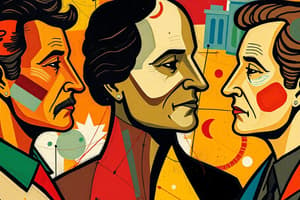Podcast
Questions and Answers
Which subfield of political science focuses on the relationships between countries?
Which subfield of political science focuses on the relationships between countries?
- Public Policy
- International Relations (correct)
- Political Theory
- Comparative Politics
What is the main characteristic of totalitarianism?
What is the main characteristic of totalitarianism?
- Power shared among various groups
- Political pluralism with multiple voices
- Emphasis on individual freedoms
- Control of all aspects of life by the state (correct)
Which political ideology advocates for social ownership of resources?
Which political ideology advocates for social ownership of resources?
- Conservatism
- Socialism (correct)
- Fascism
- Liberalism
What is the role of the judiciary in a political system?
What is the role of the judiciary in a political system?
Which term describes legitimate power that is recognized and accepted by society?
Which term describes legitimate power that is recognized and accepted by society?
What is the primary focus of qualitative research methods?
What is the primary focus of qualitative research methods?
Which of the following best describes globalization?
Which of the following best describes globalization?
What is a key characteristic of populism in politics?
What is a key characteristic of populism in politics?
Which of the following methods is an example of quantitative research?
Which of the following methods is an example of quantitative research?
Which trend reflects a growing concern for environmental issues in politics?
Which trend reflects a growing concern for environmental issues in politics?
Flashcards are hidden until you start studying
Study Notes
Overview of Political Science
- Definition: The study of politics, government systems, and political behavior.
- Subfields:
- Comparative Politics
- International Relations
- Political Theory
- Public Administration
- Public Policy
Key Concepts
- Power: The ability to influence or control others and outcomes.
- Authority: Legitimate power recognized by society.
- Sovereignty: The ultimate authority within a territory.
- State: A political entity with a defined territory, a permanent population, a government, and the capacity to enter relations with other states.
Political Systems
- Democracy: Government by the people, either directly or through elected representatives.
- Types:
- Direct Democracy
- Representative Democracy
- Types:
- Authoritarianism: Concentration of power in a single authority or a small group, with limited political freedoms.
- Totalitarianism: An extreme form of authoritarianism where the state seeks to control all aspects of public and private life.
Political Ideologies
- Liberalism: Emphasizes individual freedoms, democracy, and free markets.
- Conservatism: Advocates for tradition, social stability, and maintaining established institutions.
- Socialism: Focuses on social ownership and egalitarian distribution of resources.
- Fascism: Authoritarian nationalism characterized by dictatorial power and suppression of opposition.
Institutions
- Legislative Bodies: Responsible for making laws (e.g., Congress, Parliament).
- Executive Branch: Implements and enforces laws (e.g., President, Prime Minister).
- Judiciary: Interprets laws and administers justice (e.g., Supreme Court).
Political Behavior
- Voting: Key mechanism for expressing citizen preferences; influenced by factors such as socioeconomic status, education, and party affiliation.
- Political Parties: Organizations that seek to gain power by winning elections; they represent various ideologies and interests.
- Interest Groups: Organizations that advocate for specific issues or causes to influence public policy.
International Relations
- Theories:
- Realism: Focuses on state power and security.
- Liberalism: Promotes cooperation and international institutions.
- Constructivism: Emphasizes the role of ideas, identities, and norms.
- Key Concepts:
- Diplomacy: The practice of conducting negotiations between representatives of states.
- War: A conflict between organized groups, often involving states.
- Globalization: The interconnectedness of economies, societies, and cultures.
Research Methods
- Qualitative Methods: Interviews, case studies, and ethnography to gather in-depth understanding.
- Quantitative Methods: Surveys, statistical analysis, and experiments to analyze data and test hypotheses.
Current Trends
- Populism: Rise of leaders claiming to represent the "common people" against elites.
- Identity Politics: Political positions based on the interests and perspectives of social groups.
- Climate Politics: Growing focus on environmental issues and international agreements.
Conclusion
Political science provides insights into the functioning of political systems, behavior, and ideologies, influencing governance and public policy on a global scale.
Overview of Political Science
- Involves the exploration of politics, government systems, and the behavior of political entities.
- Key subfields include Comparative Politics, International Relations, Political Theory, Public Administration, and Public Policy.
Key Concepts
- Power: Central to politics, defined as the capacity to influence or control others and outcomes.
- Authority: Distinct from power; recognized legitimacy by society and institutions.
- Sovereignty: Concept where an entity possesses ultimate authority over a specified territory.
- State: A political unit characterized by defined territory, permanent population, organized government, and capability to engage in relations with other states.
Political Systems
- Democracy: Governance system characterized by rule by the people, either directly or via elected representatives. Includes:
- Direct Democracy: Citizens directly participate in decision-making.
- Representative Democracy: Citizens elect representatives to make decisions on their behalf.
- Authoritarianism: Centralized power held by a single authority or small group, often with restricted political freedoms.
- Totalitarianism: An extreme form of authoritarianism, where even private life is regulated by the state.
Political Ideologies
- Liberalism: Prioritizes individual freedoms, democracy, and market economy.
- Conservatism: Emphasizes value in tradition and maintaining established institutions for social stability.
- Socialism: Advocates for social ownership and equitable resource distribution.
- Fascism: Defined by authoritarian nationalism, with a dictatorial leader and suppression of dissent.
Institutions
- Legislative Bodies: Entities like Congress or Parliament that create laws.
- Executive Branch: Comprises leaders like Presidents or Prime Ministers responsible for law enforcement and administration.
- Judiciary: Courts and legal systems that interpret laws and administer justice, exemplified by the Supreme Court.
Political Behavior
- Voting: Primary method for citizens to express preferences, influenced by socioeconomic status, education, and party affiliation.
- Political Parties: Institutions aimed at winning political power by contesting elections, representing diverse ideologies and interests.
- Interest Groups: Organizations that promote specific causes or issues to shape public policy.
International Relations
- Theories of International Relations:
- Realism: Focuses on national power and security as primary factors in international relations.
- Liberalism: Highlights the importance of cooperation and international institutions.
- Constructivism: Analyzes how ideas, identities, and norms shape international interactions.
- Key Concepts:
- Diplomacy: Process of negotiation among state representatives.
- War: Organized combat, frequently involving conflicts between states.
- Globalization: A phenomenon of increasing interconnectedness between global economies, societies, and cultures.
Research Methods
- Qualitative Methods: Utilize interviews, case studies, and ethnography for comprehensive insights and understanding.
- Quantitative Methods: Employ surveys, statistical analysis, and experimental designs to test hypotheses and analyze data.
Current Trends
- Populism: Emergence of leaders appealing to the public against perceived elite interests.
- Identity Politics: Focuses on political expressions shaped by social group identities and interests.
- Climate Politics: Heightened emphasis on environmental issues and the development of international agreements.
Conclusion
Political science encompasses the analysis of political systems, behaviors, and ideologies, significantly informing governance and policymaking at a global level.
Studying That Suits You
Use AI to generate personalized quizzes and flashcards to suit your learning preferences.



